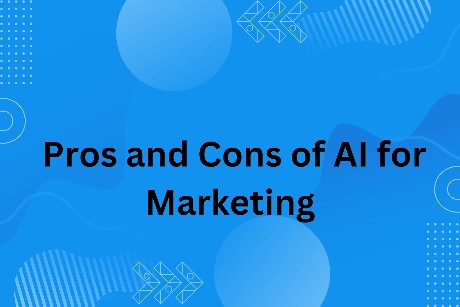Navigating the Landscape: Pros and Cons of AI in Marketing
Artificial Intelligence (AI) has become a transformative force in the realm of marketing, reshaping strategies and providing new avenues for businesses to connect with their audience. Let’s delve into the pros and cons of integrating AI into marketing practices.

I. Pros of AI in Marketing: Unleashing Innovative Possibilities
1. Precision Targeting:
AI Advantage: AI algorithms analyze vast datasets to identify precise audience segments, ensuring targeted marketing efforts and improved conversion rates.
2. Personalization at Scale:
AI Advantage: Personalized experiences are automated, allowing businesses to tailor content, recommendations, and interactions for individual users on a large scale.
3. Enhanced Customer Insights:
AI Advantage: Advanced analytics and machine learning provide deeper insights into customer behaviors, preferences, and trends, empowering businesses to make data-driven decisions.
4. Automation for Efficiency:
AI Advantage: Automation of repetitive tasks, from email campaigns to social media scheduling, streamlines processes, saving time and resources while improving overall efficiency.
5. Predictive Analytics:
AI Advantage: Predictive models forecast future trends and customer behaviors, enabling marketers to proactively adjust strategies and stay ahead of the competition.
II. Cons of AI in Marketing: Navigating Challenges
1. Initial Implementation Costs:
AI Challenge: Integrating AI systems can require significant upfront investments in technology, training, and infrastructure.
2. Data Privacy Concerns:
AI Challenge: Collecting and analysing extensive customer data raises concerns about privacy and security, requiring robust measures to comply with regulations and build trust.
3. Dependence on Quality Data:
AI Challenge: The effectiveness of AI depends on the quality of input data. Inaccurate or biased data can lead to flawed insights and decision-making.
4. Limited Creativity and Intuition:
AI Challenge: While AI excels at data-driven tasks, it may struggle with creative, intuitive aspects of marketing that require a human touch.
5. Potential Job Displacement:
AI Challenge: The automation of routine tasks may lead to job displacement in certain areas of marketing, necessitating a shift in workforce skill sets.
III. Striking a Balance: Best Practices for AI Integration
1. Robust Data Governance:
Recommendation: Implement strong data governance practices, ensuring ethical data collection, storage, and usage.
2. Continuous Learning and Adaptation:
Recommendation: Foster a culture of continuous learning, encouraging marketers to adapt their skills alongside evolving AI technologies.
3. Human-AI Collaboration:
Recommendation: Embrace a collaborative approach, combining the strengths of AI in data analysis with human creativity and emotional intelligence.
4. Transparent AI Processes:
Recommendation: Prioritize transparency in AI processes, helping build trust with customers and addressing concerns related to data privacy.
5. Scalable and Sustainable AI Integration:
Recommendation: Plan for scalability and sustainability in AI integration, ensuring that the chosen solutions align with long-term business goals.
IV. Navigating the AI Marketing Landscape
As businesses tread the path of AI integration in marketing, understanding both the advantages and challenges is paramount. Striking a balance between leveraging AI for efficiency and preserving the human touch ensures a dynamic and successful marketing strategy.
